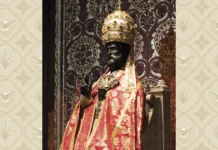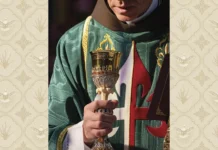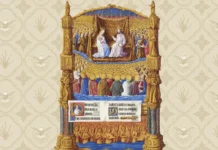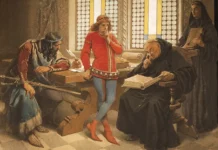Those who recognize the darkness of their blindness and understand that they lack eternal light, should cry from the depth of their hearts like the blind man of Jericho: “Jesus, son of David, have mercy on me!”
O ur Redeemer, foreseeing that His Passion would trouble the souls of His Apostles, prepared them well in advance. He revealed the sufferings He would undergo and the glory of His Resurrection so that, seeing Him die as He had told them, they would not doubt that He would also resurrect.
However, because His disciples, being as yet carnal, could not understand the mystery of which He spoke to them, He had recourse to a miracle. Before their eyes, the sight of a blind man was opened to the light, so that this heavenly action would strengthen the faith of those who did not understand the words of the heavenly mystery.
Symbol of the human race, deprived of the light by sin
Now it is necessary, dear brothers, to recognize in the miracles of the Lord Our Saviour, facts which we must believe have been effectively accomplished, but which, as signs, teach us something. For the works of the Lord testify, by their power, to certain truths, while by their mystery they proclaim others.
Observe that, if we restrict ourselves to the literal meaning, we do not know who the blind man was of whom the Gospel speaks, but we do know what he symbolizes in the order of mystery.
The blind man is the human race: excluded from the joys of paradise in the person of its first father, deprived of the brightness of that superior light, it suffers the darkness of its condemnation; but finding the light thanks to its Redeemer’s presence, it is able to glimpse the joys of the interior light, and desiring them, it enters upon the path of life through its good works. […]
Recognizing one’s blindness is not enough; one must cry out to Jesus
It is with reason that this blind man is represented to us as both sitting at the wayside and begging, because the Truth in person said: “I am the Way” (Jn 14:6).
He who does not know the brilliance of eternal light is therefore blind. But if he has begun to believe in the Redeemer, he is sitting by the wayside. However, if he neglects to pray and fails to beseech God to recover eternal light, the blind man is in fact seated by the wayside, but he does not beg. On the other hand, if he believes, and recognizes at the same time that his heart is blind and asks to recover the light of truth, then the blind man sits by the roadside and begs.
He, therefore, who recognizes the darkness of his blindness and understands that he lacks the light of eternity, must cry out from the depth of his heart, he must shout with all his might, imploring, “Jesus, Son of David, have mercy on me!” (Lk 18:38).
Our Lord heeds those who persevere in prayer
But let us hear what happened while the blind man shouted: “Those who were in front rebuked him, telling him to be silent” (Lk 18:39a). What do those who precede the arrival of Jesus represent, if not the crowd of carnal desires and the tempest of vices which, before the coming of Jesus into our heart, dissipate our thoughts by their assaults and hinder the appeals of our heart in prayer?
Often, indeed, when we want to return to the Lord after having sinned, and strive to overcome with prayer the vices of which we have been guilty, the memories of our past faults oppress our hearts; they dull our mind, disturb our soul and stifle the voice of our prayer. […]
Let us consider what the blind man did then, before finding the light again. The text goes on to say: “but he cried out all the more, ‘Son of David, have mercy on me!’” (Lk 18:39b). Note well, he whom the crowd rebukes in order to silence cries again even more loudly; in the same way, the more the storm of carnal thoughts torments us, the more intensely we must pray.
The crowd wants to prevent us from shouting, for even during prayer do we suffer, besieged by the remembrance of our sins. But it is necessary that the voice of our heart persists all the more loudly, in proportion to the resistance which it meets, in order to control the storm of our guilty imagination, and thereby to move, by the very excess of our insistence, the Lord’s merciful ears. […]
If we persevere insistently in our prayer, we cause Jesus who is passing by to stop in our soul. So it is added: “And Jesus stopped, and commanded him to be brought to Him” (Lk 18:40). […]

“Lord, that I may see!”
Let us also observe what He says to the blind man who approaches: “What do you want Me to do for you?” (Lk 18:41a). Was He who had the power to restore ignorant of what the blind man wanted? Of course not! But He wants us to make requests, although He knows beforehand what we will ask and what He will give us. He exhorts us to be persistent in our prayer, and thus affirms, “your Father knows what you need before you ask Him” (Mt 6: 8).
If He puts this question to us, it is so that we may make our petition to Him; if He inquires, it is to incite our hearts to prayer. So the blind man immediately responds, “Lord, that I may see!” (Lk 18:41b). What the blind man asks of the Lord is not gold, but light. He is not interested in obtaining anything other than light, for even though a blind person may possess something, he cannot, without light, see what he has.
Therefore, let us imitate, dear brothers, this man whose cure of body and soul we have just considered. Let us not ask the Lord for deceitful riches, earthly rewards, or transient honours, but for light; not the light circumscribed by space, limited by time, interrupted by night, and seen by animals as well as by us. Let us instead request that light which only Angels see with us, and which has neither beginning nor end.
The way to reach this light is faith. It is therefore with reason that the Lord responds immediately to the blind man to whom He will give light: “Receive your sight! Your faith has made you well” (Lk 18:42). ◊
Excerpts from: ST. GREGORY THE GREAT.
Homilies on the Gospels. Homily 2,
pronounced in St. Peter’s Basilica 19/11/590 –
Translation: Heralds of the Gospel







